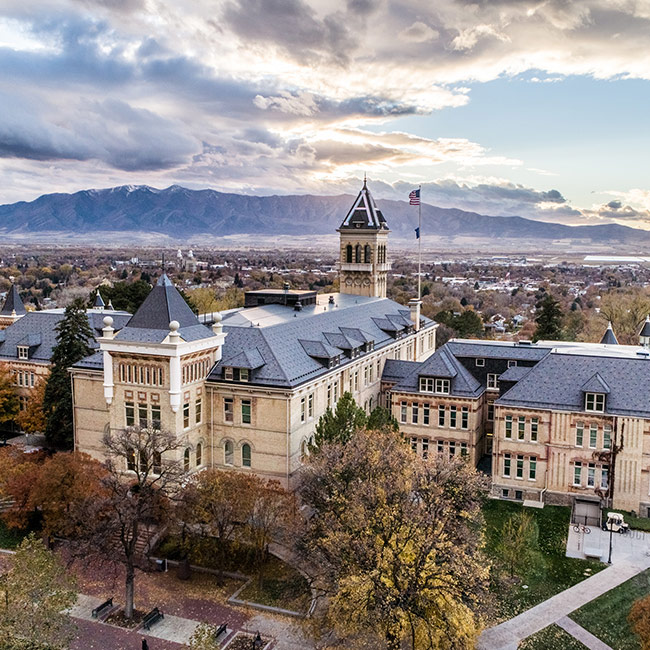About This Degree
Civil and environmental engineering is concerned with planning, designing, constructing, and operating various physical works; developing and utilizing natural resources in an environmentally sound manner; providing the infrastructure which supports the highest quality of life; and protecting public health and renovating impacted terrestrial and aquatic systems from the mismanagement of toxic and hazardous waste.
The Department of Civil and Environmental Engineering has five divisions: Environmental Engineering, Geotechnical Engineering, Structural Engineering, Transportation Engineering, and Water Engineering.
Concurrent Bachelor’s/Master’s Program:
The department also offers a concurrent bachelor’s/master’s program, which allows USU engineering students to begin taking graduate classes during their senior year as an undergraduate and to complete requirements for both the bachelor's degree (civil engineering or environmental engineering) and the master’s degree concurrently over two years.
Specialization:
Environmental Engineering:
Environmental engineering is concerned with the application of scientific and engineering principles for protection of human populations from the effects of adverse environmental factors, the protection of environments from the potentially harmful effects of natural and human activities, and the improvement of environmental quality. Environmental engineers are concerned with local and worldwide environmental issues, including the effects of acid rain, global warming, automobile emissions, and ozone depletion.
Fluid Mechanics and Hydraulic Engineering:
In this specialization, students focus on theoretical fluid mechanics and applied hydraulics, open channel hydraulics, closed conduit flow, transient and unsteady flow analysis, valve and pump engineering and testing, design and modeling of hydraulic structures, two phase flow, cavitation, sedimentation, flow resistance, flood plain management and control, and erosion control and protection.
Geotechnical Engineering:
In this specialization, students study the properties and behavior of soil and rock. Using those properties and behavior, they design and analyze foundations, excavations, retaining walls, slopes, dikes, dams, levees, and more. Geotechnical engineers also predict behavior of soil and rock during earthquake shaking. The graduate curriculum covers the theoretical behavior of soil, laboratory and field experimental methods, and current design practices.
Structural Engineering and Mechanics:
Structural Engineering is one of the oldest and largest sub-disciplines within civil engineering. The two most recognized structural categories are the design of bridges and the design of buildings. In addition to these, there are numerous other structure types, such as towers, tanks, dams, industrial facilities, etc. that structural engineers design.
Transportation Engineering:
The primary goal of this specialization is to advance the understanding of transportation systems and to improve efficiency and effectiveness of transportation systems. Students learn to solve current and future problems in the transportation industry while recognizing social, economic, and environmental constraints.
Water Resources Engineering and Hydrology:
In this specialization, research areas include climate analysis, hydrologic modeling, nonparametric statistical methods, dam safety, risk management, extreme flood hydrology, snow and snowmelt, risk-based decision analysis for water quantity and quality management, water institutions, water policies, water management, and water conservation.
Climate Adaptation Science (Civil & Environmental Engineering MS & PhD):
The Climate Adaptation Science specialization provides students with experiences in actionable science through internship and research experiences. Program includes interdisciplinary research to identify adaptive responses to changing climate extremes and two-part internships with agency, NGO, and industry partners. In a first internship, students contribute to projects and learn the workplace cultures and science needs of the host. The internship experiences inform interdisciplinary climate adaptation research by student teams. In a second internship, students share science results and tools with the host organization and help put that science into action.
ADVISING
At a Glance
College: College of Engineering
Department: Civil and Environmental Engineering Department
USU Locations:
- Logan campus
Program Requirements
Career And Outcomes
Career Opportunities
Environmental Engineering Specialization
Graduates with this specialization work in the following areas:
- Drinking water treatment
- Wastewater treatment
- Air quality and air pollution control
- Solid and hazardous waste management
- Pollution prevention
- Water quality modeling
- Fate and transport of environmental contaminants
- Natural systems engineering
- Wildlife protection
Geotechnical Engineering Specialization
All master's graduates work as geotechnical engineers in the areas listed below, while PhD graduates work in academia or pursue research positions at consulting firms or research organizations.
- Consulting firm
- State and government agencies, primarily the Army Corps of Engineers, state highway departments, and the Federal Highway Administration
- Geotechnical specialty contractors
Hazardous Waste Management
Structural Engineering and Mechanics Specialization
Graduates with this specialization have many potential career paths. The following is a partial list:
- Structural consulting firms
- Additional education in engineering, architecture, or other professional fields such as business, medicine, law, etc.
- Professor (teaching and research)
Transportation Engineering Specialization
Graduates in this specialization work as transportation engineers in the following areas:
- Federal Highway Administration
- State Department of Transportation
- Metropolitan Planning Organization
- City, county, and state engineers
- Private consulting in transportation and logistics
- Research institutes and universities
- Railroads, trucking firms, etc.
Fluid Mechanics and Hydraulic Engineering Specialization or Water Resources Engineering and Hydrology Specialization
Graduates can work as engineers in the following capacities:
- Consulting in water resources, hydraulics, or hydrology
- Engineers for consulting and construction companies
- University professors (PhD)
- Research engineers
Job Outlook
USU Locations

LOGAN CAMPUS
Admission
Admission Requirements
Students without undergraduate civil and environmental engineering backgrounds may be required to complete select undergraduate courses prior to admission as a graduate student. This is determined by the committee on a case-to-case basis.
Application Requirements:
- Complete the online application
- Pay the $55 application fee
- Score at or above the 40th percentile on the GRE
- Have a 3.0 or higher GPA on your last 60 semester or 90 quarter credits
- Provide transcripts of all college/university credits
- Provide three contacts for letters of recommendation
International students have additional admissions requirements.
Deadlines
The department has the following deadlines:
- Fall semester – March 15 for full financial consideration, final application deadline is May 15
- Spring semester – October 15
Program Requirements
PhD Qualifying Exams:
Environmental Engineering Specialization:
- PhD students must take a comprehensive exam once core classes are completed and no later than the end of the fourth semester. The content and format of the comprehensive exam will be determined by each student’s supervisory committee.
Geotechnical Engineering Specialization:
- PhD qualifying exams are generally taken within the first few semesters and cover topics from master’s-level coursework and early PhD coursework. A dissertation proposal and defense are also required.
Hazardous Waste Management Specialization:
Structural Engineering and Mechanics Specialization:
- PhD candidates must take a qualifying exam and defense of proposed dissertation topic within the first two years of PhD study. Content of the qualifying exam and dissertation proposal defense are determined by the student’s graduate supervisory committee.
Transportation Engineering Specialization:
- PhD qualifying exams consists of a written and an oral examination, which are held after the second semester and prior to the beginning of the third semester of graduate study. The written examination will be in the form of an eight-hour exam comprised of questions from the required courses in transportation systems engineering. Upon successful completion of the written examination, the student will present and defend the dissertation proposal at an oral examination.
Fluid Mechanics and Hydraulic Engineering Specialization:
Water Resources Engineering and Hydrology Specialization:
Plan Options
Students can receive the MS or the ME by pursuing one of three options:
- In the MS Plan A option, students complete graduate-level coursework, are involved in research, and must write a thesis.
- In the MS Plan B option, students complete graduate-level coursework, work on a project, and are required to produce a report.
- A third option, ME Plan C, does not involve a thesis or a defense meeting and is comprised of coursework only.
Financial Aid
Financial assistance in the form of graduate research assistantships are awarded on a competitive basis. These enable students to work with faculty on specific research projects. Prospective students are encouraged to contact faculty members directly with questions regarding ongoing research projects and possibilities for research assistantships.
A variety of funding opportunities are available on the graduate school website.
Take The Next Step
How to Apply
View our step-by-step guide on how to become an Aggie.
Request Information
Contact the School of Graduate Studies to ask questions or receive more information.
Cost and Funding
Calculate the cost of graduate school and learn about funding opportunities.
You May Also Be Interested In

Biological Engineering
Apply engineering principles to cells, microbes, and DNA to solve society’s issues. Be part of a premier program with nationally recognized faculty and top research facilities.

Ecology
Work on exciting research projects with renowned faculty studying ecology through the lens of a variety of different scientific disciplines.

Environmental Planning
Prepare for a career helping communities with growth and development in a unique program that focuses on large-scale planning of entire geographic regions.

Irrigation Engineering
Learn to solve irrigation problems that affect the entire world in an irrigation engineering program recognized across the globe.

